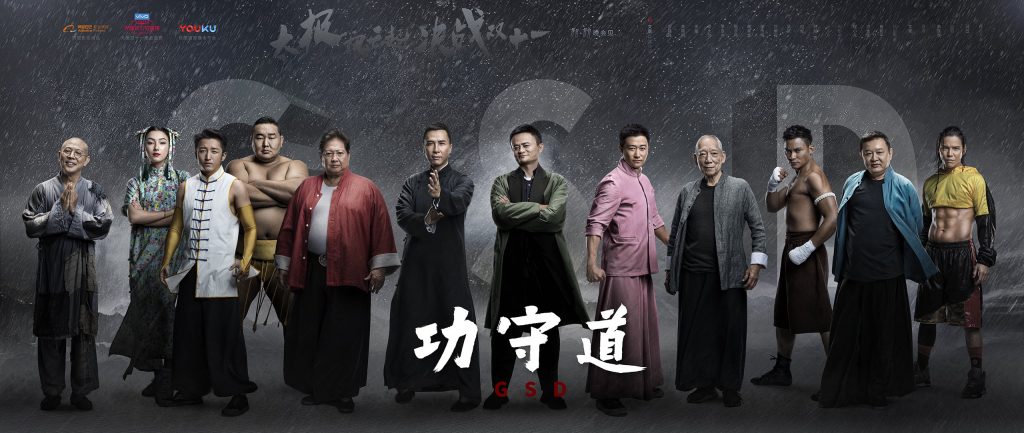The iconic actor hopes to light up future Games with an innovative take on traditional martial arts.

This Saturday will see the premiere of a new martial arts movie, “Gong Shou Dao.” With a run time of just 20 minutes, it certainly wasn’t made for its box office potential. The short film, which stars Jack Ma — the founder and executive chairman of Alibaba, China’s largest e-commerce platform — brings together 11 of China’s best-known martial artists and will premiere during the eighth annual Singles’ Day shopping event, when hundreds of millions of the world’s consumers will scour Taobao, Alibaba’s shopping platform, for deals.
The man behind the film is Jet Li, a celebrated actor whose movies include “Shaolin Temple,” “Fist of Legend,” and “Hero.” Li and Ma are co-founders of Taiji Zen, a lifestyle company that promotes wellness through a combination of tai chi and meditation. Central to the company’s ethos is gongshoudao (GSD), a new form of tai chi that Li and Ma hope will elevate Chinese martial arts to Olympic status.
Sixth Tone sat down with Li to talk about the power of tai chi, his friendship with Ma, and his future hopes for GSD. The interview has been edited for brevity and clarity.
Sixth Tone: What is special about GSD compared to other forms of martial arts, and how does it relate to the Olympics?
Jet Li: I was just 8 years old when I began studying martial arts. I’m 47 now, and over the past four decades or so, I’ve been fortunate enough to make something of a name for myself, acting in Hollywood movies and traveling the world giving talks on this distinctly Chinese form of combat. Countless Chinese dream of the day that martial arts are officially recognized as an Olympic event, but so far, we have been unsuccessful.
A key reason for our failure to date is the fact that there is no consensus on the standards or categories of the various forms of wushu — martial arts. There are simply too many styles and variations to merit inclusion in the Olympics just yet. Use your fists, and people call it boxing; use your legs, and they call it taekwondo; throw your opponent to the floor, and people call it judo. How, in the end, should we codify something as broad as Chinese martial arts? Jack [Ma] and I hope that GSD will at least define it for the purposes of international sport.
Sixth Tone: You have mastered several different martial arts styles. Why did you choose to base GSD on tai chi?
Jet Li: About seven or eight years ago, I read a Harvard University study that looked at 800 published medical papers devoted to the relative merits of tai chi, some of which concluded that it could provide relief for sufferers of heart disease, high blood pressure, arthritis, and depression. This level of discussion is almost nonexistent in China, where we tend to take it for granted that tai chi is good for us. Yet even if it is good, that doesn’t mean it’s a magical cure-all or that it obviates the need for medicine. We must keep putting our faith in science.
Around the same time, Jack and I met to talk about his dream of shooting a film to help popularize tai chi. Having practiced tai chi for 30 years, he sees it as a symbol of traditional Chinese culture. Two years later, we founded Taiji Zen together. Our shared goal is to get Chinese martial arts — specifically GSD — enshrined as an Olympic event. To this end, we have drawn up detailed rules for GSD, with an eye toward making it more combative and watchable. Domestically, the first GSD tournament will be held in Beijing on Nov. 15.
Sixth Tone: In the past, China has failed to convince the International Olympic Committee (IOC) to include traditional martial arts at the Games. How do the prospects look now?
Jet Li: In January, Alibaba put its name to a 12-year partnership with the IOC. Covering the next three Olympic cycles, the contract establishes Jack’s company as one of the IOC’s premier global partners and doubtless gives GSD a leg up in the fight for Olympic status. In fact, Jack personally explained GSD to the IOC’s current president, Thomas Bach, in August.
I don’t doubt that the Olympic spirit is a good thing. Yet even as the quest to be higher, faster, and stronger has allowed us to redefine humanity’s limits, it has also damaged athletes’ bodies. In our attempts to push ourselves, we’ve lost sight of an important part of the sporting mindset: balance. The world today is changing at an extraordinary pace, so it’s only natural to feel off-balance. But to paraphrase one of Jack’s most quoted comments, it pays to slow down if we want to live happy lives.
In 1997, around the time I was filming “Once Upon a Time in China and America,” I found myself overcome with doubt for the first time in my life. Ever since I was a little boy, I had always believed that if I simply worked hard, respected the law, and did my best, there was nothing I couldn’t accomplish.
However, at that point, I realized that in spite of all my wealth, I was still eating the same things I had always eaten and drinking more or less what I had always liked to drink. The only difference was that when I was younger, I’d relieve myself in Beijing’s public restrooms, where other guys stood in lines pissing all over the urinal trough. Now, though, I lived in a big home with something like eight bathrooms. That was the grand sum of all my achievements: a different bathroom for each day of the week.
I used to believe there were only four things that mattered in life: fame, money, power, and love. Now, I realize that’s not the case, and I know that I must gain a clear perspective on what life is really about. Not long ago, I found myself chatting with Yang Xingnong, Taiji Zen’s CEO and the dean of our academy. Over the course of two hours, we talked about everything from movies and martial arts training to charity and altruism, yet we kept circling back to the same questions: What is life? What is pain? What is love? What, at the end of the day, is the point of living?
Sixth Tone: How does your adaptation of tai chi capture those moral revelations?
Jet Li: GSD combines physical training with the sort of meditative self-reflection you might expect from Zen Buddhism. Over the past few years, I’ve spent six hours a day meditating, searching for the answers to these questions. I’ve tried going without life’s mundanities — I once went over a week without showering — and attempted a couple things more grandiose, such as when I spent several years staring into caves high in the Nepalese Himalayas. I’m happier than I’ve ever been, because today, my thoughts and purpose are fully aligned.
When people hear the name Jet Li, they tend to think of the martial artist, the kid who started studying when he was 8 before becoming a national champion and entering the film industry. My first movie, “Shaolin Temple,” came out in 1982 and broke Chinese mainland box office records for a Mandarin-language film. Though I went on to enjoy a successful career in Hong Kong and Hollywood, that Jet Li has now stepped out of the public eye.
These days, I spend my time thinking about how I can help people live better, including through charitable work. Ten years ago, I launched the One Foundation, a charity focused on helping communities recover from disasters, protecting and educating children, peer support, and innovation.
Sixth Tone: Your 1982 film debut, “Shaolin Temple,” made Chinese viewers fall back in love with martial arts. Are you expecting to leave a similar impression with GSD?
Jet Li: I like to say that while “Shaolin Temple” revived interest in martial arts, it failed to capture their essence. The action-packed movie inspired a generation of kids who dreamed of one day being martial artists, but ended up as security guards. My current hope is that Taiji Zen will cultivate a generation of Zen practitioners, thinkers, and warriors — a generation in which everyone has their own thoughts and outlook on life, and everyone is receptive to feedback and willing to support one another. No more children will grow up dreaming of becoming mere fighters; they will also know the value of Zen as a guiding path to self-realization.
China’s national character is scarred by memories of fighting foreign aggression. But the tide has turned. Today, there’s no need to go around talking about how strong the Chinese people are. Fundamental to tai chi is a spirit of peaceful coexistence — the belief that in you, there is a piece of me, and in me a piece of you. All of us share this spirit, regardless of ethnicity. At present, there are about 150 million tai chi practitioners around the world, and the global influence of Chinese martial arts is something I am immensely proud of.
I hope tai chi, in the form of GSD, has a good chance of becoming an Olympic sport. Two of the characters in its Chinese name, gong and shou, stand for “kung fu” and “defense,” respectively. China has been an agricultural civilization for centuries, and although the country is now industrializing rapidly, different forms of kung fu, including tai chi, play a vital — I would even say foundational — role in Chinese culture as a means of protecting our homes, land, and territorial integrity. In the future, I hope to see GSD become a symbol similarly deserving of our pride in China’s martial heritage.
–This article originally appeared on Sixth Tone.





